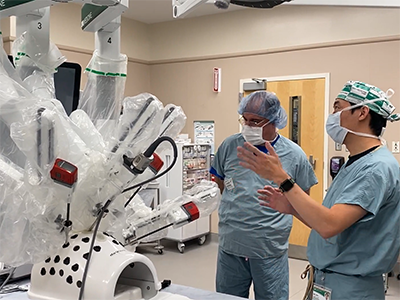According to the U.S. Department of Education, research shows that early exposure to STEM (science, technology, engineering, and math) careers has positive impacts across the entire spectrum of learning. This statistic is promising to those working to diversify STEM workforces, such as surgery.
 ScienceDaily shares that only about one in five surgeons practicing in U.S. is female, and the Association of American Medical Colleges notes that, in 2018, five percent of surgeons identified as Black or African American.
ScienceDaily shares that only about one in five surgeons practicing in U.S. is female, and the Association of American Medical Colleges notes that, in 2018, five percent of surgeons identified as Black or African American.
So, when Mcwane Science Center contacted the University of Alabama at Birmingham Department of Surgery about an opportunity to develop a Surgical Systems program, geared to middle and high school children, Daniel Chu, M.D., associate professor, answered the call.
“I have children of my own, and I know how important it is for them to actually see what it is like to be in a STEM career to understand it and want to pursue it,” said Chu. “So, I was thrilled to be able to share what it is like to be a surgeon and talk about our robotic surgical systems with students in the Birmingham area.”
The McWane Surgical Systems program–first piloted in September with Chu at the helm– introduces middle and high-school aged students to the medical field, and surgery, in particular. And, it serves the Birmingham City School population of students– 99 percent of these students are considered in to be an underrepresented minority, with a majority of these students being Black.
Lawrence Cooper with Build-up, a not for profit school in Birmingham, Alabama, helped pilot the program with his class. Cooper notes the importance of sharing STEM careers, particularly with communities who are underrepresented in medicine.
"The group of students that participated in the pilot session were high school students in the Build Up Community School. The community school is an early college, workforce-development high school serving the Birmingham Metro area,” said Cooper. “Participating in the ‘Surgical Systems program ensures these students see potential paths and future careers through a one-of-a-kind experience.”
Jonah Cohen, director of science education at McWane Science Center, moderates the program while students learn about surgeons and examine the technology they use – including the robotic da Vinci surgical system. The program covers human anatomy, a live talk with a member of the UAB Department of Surgery (which was Chu for the initial program), and footage of a real operation. Plus, curious learners get to ask any and all questions that they can think of while watching the surgery with the expert.
Amy Templton, president and CEO of McWane, was thankful to Chu and Cohen, for collaborating to bring the program to life.
“Dr. Daniel Chu does an outstanding job narrating the surgery in ways that help young people understand complex procedures. He also answers questions about what it takes to become a surgeon and encourages students to believe that they can aspire to a similar career someday. This is a not-to-be missed opportunity for teachers and their students.”
In the future, Chu and the McWane team hope to run more Surgical Systems programming for interested school systems and continue to inspire students across Birmingham to consider a career in surgery or beyond.